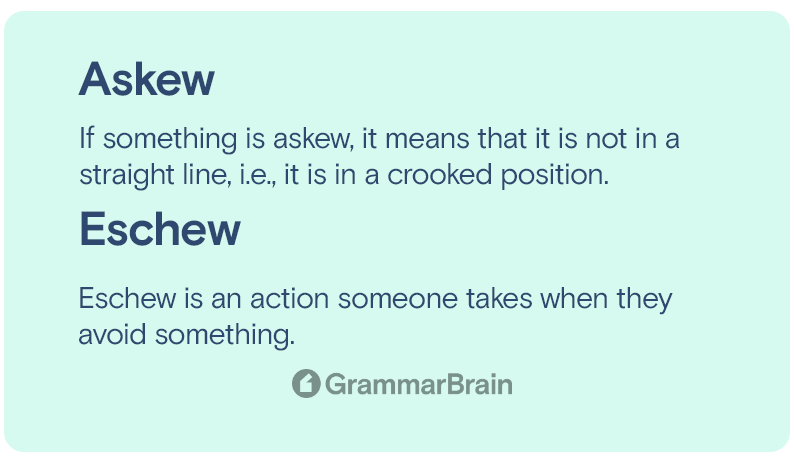Askew and Eschew are two words that can be easily confused with each other because of their similar pronunciation and spelling. However, both words have very different meanings and are different types of speech.
Askew vs Eschew: How are they Different?
According to Merriam-Webster Dictionary, askew means out of line or at an angle. It is used as an adverb or adjective, meaning it is used to modify a verb or noun.
To eschew means to avoid habitually, especially on moral or practical grounds. Eschew is used as a verb, meaning it is used to define an action.

Askew Definition and Examples
If something is askew, it means that it is not in a straight line, i.e., it is in a crooked position. It can be used to describe something that is in motion or stationary. Here are some ways askew can be used in sentences.
“Martha was irked because John’s hat was askew.”
In this instance, John’s hat, a stationary object, lies on one side of his head.
“When John lost his money, his plans to build a house went askew.”
In this example, John’s plans go askew, meaning they become ruined, when he loses his money.
Askew can also be used in conjunction with the word “throw.” For instance, the phrase “to throw askew” means to knock something off course.
For example, if we modify the above example:
“John’s plans to build a house were thrown askew when he lost all his money.”
Eschew Definition and Examples
Eschew is an action someone takes when they avoid something. Eschew is used as a verb in sentences. Here are some ways eschew can be used.
“Sarah pled with his coworkers to eschew violence in their protests.”
In this example, Sarah asks her colleagues to avoid violence in their protests.
“Although Harry eschewed hopes of winning the cricket match, he still wanted to play his best.”
In this instance, Harry has given up any hope of winning the cricket match he is playing, yet wants to try and play his best.
Eschew is not normally used in relation to a person or a physical object. It is usually used to denote the avoidance or shunning of something intangible such as an idea or a concept.
What are the Synonyms and Antonyms of Askew?
Synonyms of askew include:
Aslant, atilt, awry, crooked, lopsided, oblique, off-kilter, pitched, skewed, slanted, slanting, tilted, tipping, uneven.
Antonyms of askew include:
Even, level, straight.
What are the Synonyms and Antonyms of Eschew?
Synonyms for eschew include:
Avoid, dodge, duck, elude, escape, evade, finesse, get around, scape, shake, shirk, shuffle (out of), shun, weasel (out of).
Antonyms for eschew include:
Face, keep, meet, take on, embrace, indulge in.
Did You Know?
The words askew and eschew have similar origins.
Eschew comes from the Anglo-French word, “eschiver”, which means to escape or avoid. The word askew is formed by adding the prefix ‘a-‘ to “skew,” which also finds its origin in the Anglo-French word, “eschiver.”
Conclusion
Askew and eschew are words that are not commonly used in everyday speech. While they may look similarly spelled, not only are the meanings of the two words very different, but the exact pronunciations also differ.
While askew has a hard “k” sound, in eschew, c is almost silent, leading to a “sh” sound.
Inside this article
Fact checked:
Content is rigorously reviewed by a team of qualified and experienced fact checkers. Fact checkers review articles for factual accuracy, relevance, and timeliness. Learn more.
Core lessons
Glossary
- Abstract Noun
- Accusative Case
- Anecdote
- Antonym
- Active Sentence
- Adverb
- Adjective
- Allegory
- Alliteration
- Adjective Clause
- Adjective Phrase
- Ampersand
- Anastrophe
- Adverbial Clause
- Appositive Phrase
- Clause
- Compound Adjective
- Complex Sentence
- Compound Words
- Compound Predicate
- Common Noun
- Comparative Adjective
- Comparative and Superlative
- Compound Noun
- Compound Subject
- Compound Sentence
- Copular Verb
- Collective Noun
- Colloquialism
- Conciseness
- Consonance
- Conditional
- Concrete Noun
- Conjunction
- Conjugation
- Conditional Sentence
- Comma Splice
- Correlative Conjunction
- Coordinating Conjunction
- Coordinate Adjective
- Cumulative Adjective
- Dative Case
- Determiner
- Declarative Sentence
- Declarative Statement
- Direct Object Pronoun
- Direct Object
- Diction
- Diphthong
- Dangling Modifier
- Demonstrative Pronoun
- Demonstrative Adjective
- Direct Characterization
- Definite Article
- Doublespeak
- False Dilemma Fallacy
- Future Perfect Progressive
- Future Simple
- Future Perfect Continuous
- Future Perfect
- First Conditional
- Irregular Adjective
- Irregular Verb
- Imperative Sentence
- Indefinite Article
- Intransitive Verb
- Introductory Phrase
- Indefinite Pronoun
- Indirect Characterization
- Interrogative Sentence
- Intensive Pronoun
- Inanimate Object
- Indefinite Tense
- Infinitive Phrase
- Interjection
- Intensifier
- Infinitive
- Indicative Mood
- Participle
- Parallelism
- Prepositional Phrase
- Past Simple Tense
- Past Continuous Tense
- Past Perfect Tense
- Past Progressive Tense
- Present Simple Tense
- Present Perfect Tense
- Personal Pronoun
- Personification
- Persuasive Writing
- Parallel Structure
- Phrasal Verb
- Predicate Adjective
- Predicate Nominative
- Phonetic Language
- Plural Noun
- Punctuation
- Punctuation Marks
- Preposition
- Preposition of Place
- Parts of Speech
- Possessive Adjective
- Possessive Determiner
- Possessive Case
- Possessive Noun
- Proper Adjective
- Proper Noun
- Present Participle
- Prefix
- Predicate



